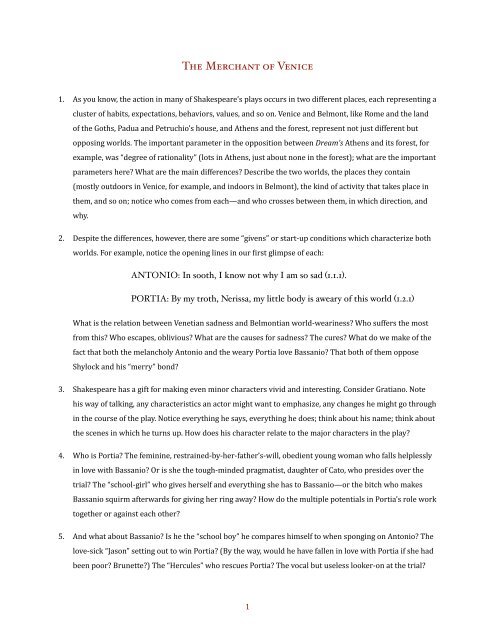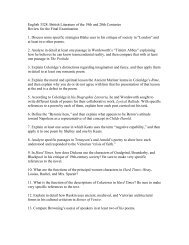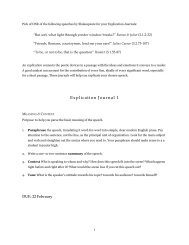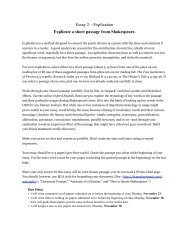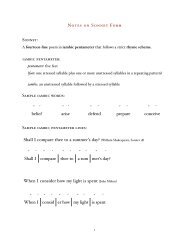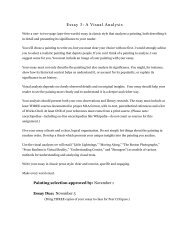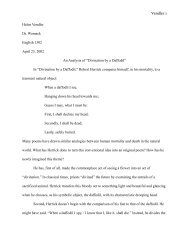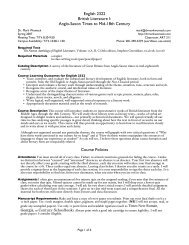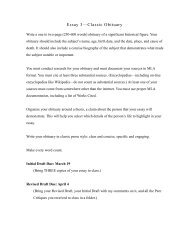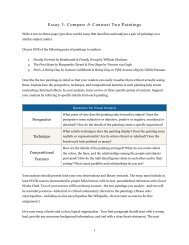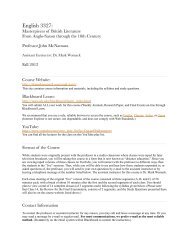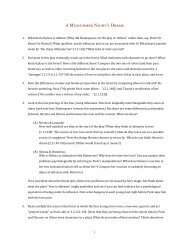The Merchant of Venice - Dr. Mark Womack
The Merchant of Venice - Dr. Mark Womack
The Merchant of Venice - Dr. Mark Womack
Create successful ePaper yourself
Turn your PDF publications into a flip-book with our unique Google optimized e-Paper software.
<strong>The</strong> <strong>Merchant</strong> <strong>of</strong> <strong>Venice</strong><br />
1. As you know, the action in many <strong>of</strong> Shakespeare’s plays occurs in two different places, each representing a <br />
cluster <strong>of</strong> habits, expectations, behaviors, values, and so on. <strong>Venice</strong> and Belmont, like Rome and the land <br />
<strong>of</strong> the Goths, Padua and Petruchio’s house, and Athens and the forest, represent not just different but <br />
opposing worlds. <strong>The</strong> important parameter in the opposition between <strong>Dr</strong>eam’s Athens and its forest, for <br />
example, was “degree <strong>of</strong> rationality” (lots in Athens, just about none in the forest); what are the important <br />
parameters here? What are the main differences? Describe the two worlds, the places they contain <br />
(mostly outdoors in <strong>Venice</strong>, for example, and indoors in Belmont), the kind <strong>of</strong> activity that takes place in <br />
them, and so on; notice who comes from each—and who crosses between them, in which direction, and <br />
why. <br />
2. Despite the differences, however, there are some “givens” or start-‐up conditions which characterize both <br />
worlds. For example, notice the opening lines in our Sirst glimpse <strong>of</strong> each: <br />
ANTONIO: In sooth, I know not why I am so sad (1.1.1).<br />
PORTIA: By my troth, Nerissa, my little body is aweary <strong>of</strong> this world (1.2.1)<br />
What is the relation between Venetian sadness and Belmontian world-‐weariness? Who suffers the most <br />
from this? Who escapes, oblivious? What are the causes for sadness? <strong>The</strong> cures? What do we make <strong>of</strong> the <br />
fact that both the melancholy Antonio and the weary Portia love Bassanio? That both <strong>of</strong> them oppose <br />
Shylock and his “merry” bond? <br />
3. Shakespeare has a gift for making even minor characters vivid and interesting. Consider Gratiano. Note <br />
his way <strong>of</strong> talking, any characteristics an actor might want to emphasize, any changes he might go through <br />
in the course <strong>of</strong> the play. Notice everything he says, everything he does; think about his name; think about <br />
the scenes in which he turns up. How does his character relate to the major characters in the play? <br />
4. Who is Portia? <strong>The</strong> feminine, restrained-‐by-‐her-‐father’s-‐will, obedient young woman who falls helplessly <br />
in love with Bassanio? Or is she the tough-‐minded pragmatist, daughter <strong>of</strong> Cato, who presides over the <br />
trial? <strong>The</strong> “school-‐girl” who gives herself and everything she has to Bassanio—or the bitch who makes <br />
Bassanio squirm afterwards for giving her ring away? How do the multiple potentials in Portia’s role work <br />
together or against each other? <br />
5. And what about Bassanio? Is he the “school boy” he compares himself to when sponging on Antonio? <strong>The</strong> <br />
love-‐sick “Jason” setting out to win Portia? (By the way, would he have fallen in love with Portia if she had <br />
been poor? Brunette?) <strong>The</strong> “Hercules” who rescues Portia? <strong>The</strong> vocal but useless looker-‐on at the trial? <br />
1
<strong>The</strong> chastened husband at the end? Is this going to be a good marriage? <br />
6. Shylock has been played as a comic butt with a red wig and a fake nose, as a sinister villain, as an innocent <br />
scapegoat, and as a tragic hero. Which is truest to the play? In answering, you should decide what exactly <br />
are the characteristics which identify him as different from the other Venetians. (Think about his way <strong>of</strong> <br />
talking, his attitude toward music, his idea <strong>of</strong> fun, and so on, as well as his attitude toward money.) He is <br />
in fact the opposite in every way <strong>of</strong> the central Venetian, Antonio. Why is the play called <strong>The</strong> <strong>Merchant</strong> <strong>of</strong> <br />
<strong>Venice</strong> and not <strong>The</strong> Jew <strong>of</strong> <strong>Venice</strong>? Do Shylock and Antonio have anything in common? <br />
7. <strong>The</strong>re are other “Others” in this play as well. Portia (<strong>of</strong> all people!) makes fun <strong>of</strong> national Others when she <br />
mocks her foreign suitors; one <strong>of</strong> those suitors, the Prince <strong>of</strong> Morocco, is a racial Other. And Jessica and <br />
Portia represent the gendered Other, women subject to patriarchal fathers with strong “wills” who try to <br />
arrange their marriages. Consider how Shakespeare represents the various attitudes towards these <br />
Others. <br />
8. Portia’s would-‐be lovers must choose among three caskets, each identiSied by (1) a type <strong>of</strong> metal, and (2) <br />
a verbal message attached to it. How are the two related? How is each suitor’s choice appropriate to his <br />
character? What is it about Bassanio that allows him to choose correctly? (or does Portia give him a hint <br />
in the song? Notice what the song says and what its opening rhyming sound is) <br />
9. Act 5 is in some ways rather strange. Look at the lovers cited by the lovers Lorenzo and Jessica: are they <br />
appropriate Sigures to preside over their declarations <strong>of</strong> love to one another? After their exchange we <br />
hear music and a discussion <strong>of</strong> the powers <strong>of</strong> music (remember when music was mentioned earlier in the <br />
play!): what function does this have? And what about Portia’s little exchange with Nerissa, which follows <br />
next, about candles and moons, substitutes and kings, and things that “by season, season’d are” (5.1.107)? <br />
10. What does the Sinal ring scene add? <strong>The</strong> play could have ended with the trial scene—all the couples have <br />
gotten together and Antonio has escaped from Shylock’s knife. This feels like closure already; so why <br />
doesn’t Shakespeare close? Why does the play end with a bawdy pun? <br />
2


